Moving To Portugal:
Complete Guide For Expats In 2026
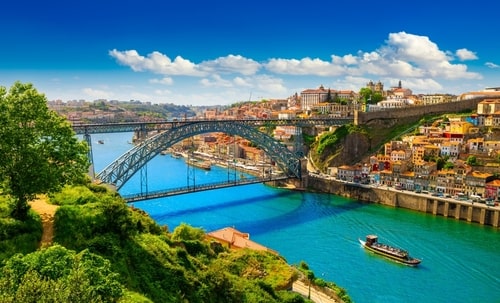
Portugal has become one of the most popular destinations for expats, retirees, and remote workers looking for a high quality of life, affordable living costs, and a relaxed European lifestyle. With its warm climate, rich culture, and welcoming communities, the country offers a perfect mix of modern conveniences and Old-World charm.
Whether you’re relocating for work, retirement, or adventure, Portugal provides a range of visa options, a strong healthcare system, and a thriving expat community.
This guide will walk you through everything you need to know about moving to Portugal, from how to buy a property and residency requirements to cost of living, healthcare, and cultural differences. Whether you’re drawn to the bustling streets of Lisbon, tourist hotspots like the Algarve, or the historic charm of Porto, Portugal offers something for everyone looking for a new life abroad.
- Moving To Portugal: Complete Guide For Expats In 2026
- Reasons to Move To Portugal
- Residency and Visa Options in Portugal
- Cost of Living in Portugal
- Finding Housing in Portugal
- Healthcare in Portugal for Expats
- Working in Portugal
- Portugal’s Education System
- Portuguese Culture & Lifestyle
- Challenges of Moving to Portugal
- Is Portugal The Right Move?
- Sign up to Overseas Dream Home now, and Discover The Best Places in the World to Buy Real Estate 2025.
- Portugal Real Estate Resources

Reviewed by Ronan McMahon
Ronan McMahon is an Amazon best-selling author and expert in international real estate. He regularly contributes to Overseas Dream Home. Visit his website at ronanmcmahon.com
Reasons to Move To Portugal
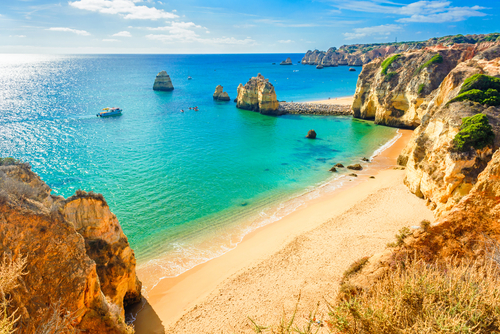
From its stunning beaches to its charming towns, Portugal has become one of Europe’s most popular countries for both tourists and expats.
Portugal has become one of the top destinations for expats, offering a unique mix of affordability, safety, and high quality of life. Whether you’re looking for a place to retire, work remotely, or start a new adventure, Portugal has plenty to offer.
One of the biggest reasons people move to Portugal is its cost of living. Compared to the U.S., Canada, and many Western European countries, Portugal is significantly more affordable. Housing, dining, and healthcare costs are lower, allowing expats to enjoy a comfortable lifestyle without breaking the bank. Cities like Lisbon and Porto are slightly more expensive, but even they remain more affordable than other European capitals.
The country’s Mediterranean climate is another major draw. With over 300 days of sunshine per year, Portugal enjoys mild winters and warm summers. The Algarve region is particularly famous for its pleasant weather, making it a top choice for retirees and beach lovers.
Portugal also has a strong healthcare system, offering high-quality medical care at a fraction of the cost found in other Western countries. The public healthcare system (SNS) provides affordable services, while private healthcare offers quicker access to specialists and world-class facilities. Many expats choose a combination of both systems to ensure comprehensive coverage.
For those looking for a relaxed lifestyle, Portugal delivers. The pace of life is slower, emphasizing work-life balance, family, and socializing. The culture is welcoming, and locals are known for their hospitality. English is widely spoken in major cities and tourist areas, but learning some Portuguese can help with integration and daily life.
Safety is another reason why Portugal is a great place to live. It is consistently ranked as one of the safest countries in the world, with low crime rates and a peaceful environment. This makes it ideal for families, retirees, and solo travelers looking for a secure place to call home.
For remote workers and digital nomads, Portugal is also an attractive choice. The D7 Visa and Digital Nomad Visa allow non-EU citizens to live and work remotely in the country. With excellent infrastructure, affordable coworking spaces, and reliable internet, Portugal is quickly becoming a hotspot for remote professionals.
With its mix of affordability, great weather, excellent healthcare, and welcoming culture, Portugal continues to be a top choice for expats seeking a better quality of life.
Residency and Visa Options in Portugal
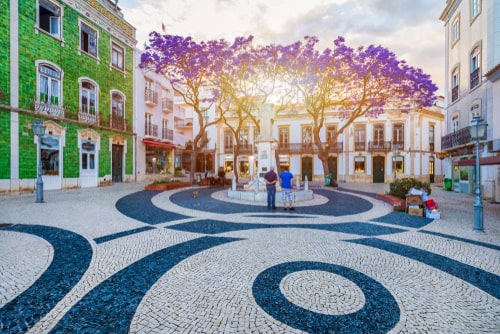
Portugal has a range of visas on offer, whether you can stay stay for a few months or longer term.
Portugal offers several visa and residency options for expats, making it an attractive destination for retirees, remote workers, and investors. The country has clear pathways for both temporary and permanent residence, depending on an individual’s financial situation, employment status, or investment interests.
For non-EU citizens, one of the most common options is the D7 Visa, also known as the Passive Income Visa. This visa is ideal for retirees and individuals with stable, passive income sources such as pensions, rental income, or dividends. To qualify, applicants must prove they have sufficient funds to support themselves, with the minimum income requirement being around €820 per month for a single applicant, increasing for additional family members, along with a €12,000 bank deposit.
Another popular option is the Golden Visa, though recent changes (as of October 2023) have eliminated real estate purchases and capital transfers as qualifying investments. Instead, eligible investment options now include:
- A €500,000 investment in Portuguese investment or venture capital funds that support economic growth.
- The creation of at least 10 full-time jobs in Portugal.
- A €500,000 contribution to scientific or technological research.
- A €250,000 donation to cultural or heritage preservation projects.
The Golden Visa remains a popular choice for those looking to obtain residency through investment, offering benefits such as free travel within the Schengen Zone and a pathway to Portuguese citizenship after five years.
For remote workers and freelancers, Portugal introduced the Digital Nomad Visa, allowing non-EU nationals to live and work remotely in the country. Applicants must demonstrate a minimum monthly income of around €3,040 and provide proof of employment or freelance work with foreign clients. This visa is particularly appealing to digital professionals who want to enjoy Portugal’s affordable cost of living and strong infrastructure.
EU/EEA and Swiss citizens can move to Portugal without a visa, but if staying longer than 90 days, they must register as residents. This involves applying for a Certificado de Registo de Cidadão da União Europeia (CRUE) at the local town hall (Câmara Municipal).
Once in Portugal, visa holders can apply for a residence permit, typically valid for one or two years and renewable. After five years of legal residence, expats can apply for permanent residency or even Portuguese citizenship, provided they meet language and integration requirements.
With flexible visa options for retirees, remote workers, and investors, Portugal makes it easy for expats to establish a new life in one of Europe’s most welcoming countries.
Cost of Living in Portugal
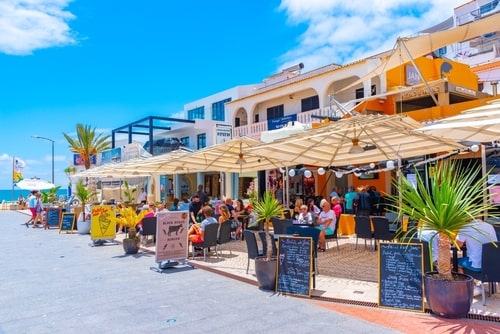
Eating out in Portugal can be inexpensive, especially away from the tourist centers.
Portugal is one of the most affordable countries in Western Europe, offering a high quality of life at a lower cost compared to the U.S., Canada, and many European nations. While expenses vary depending on location and lifestyle, many expats find that they can live comfortably on a moderate budget.
Housing costs are one of the biggest factors influencing the cost of living. In major cities like Lisbon and Porto, rent for a one-bedroom apartment in the city center ranges from $900 to $1,500 per month, while in smaller cities or rural areas, similar properties may cost between $500 and $800. Buying property is also relatively affordable compared to other European capitals, though prices have risen in recent years, especially in high-demand areas like the Algarve and Cascais.
Utilities (electricity, heating, cooling, water, and garbage) for a standard apartment typically range from $125 to $250 per month, while internet and mobile phone plans are available for as little as $35 to $50 per month.
Groceries and dining out are reasonably priced. A weekly grocery bill for a couple usually falls between €50 and €100, depending on dietary preferences and shopping habits. Eating out is also affordable, with meals at local restaurants costing €10 to €15 per person, while more upscale dining can range from €30 to €50 per meal. Portugal’s café culture is also a highlight, with espresso (or bica) available for as little as €1 in most places.
Transportation costs are low, especially in urban areas where public transit is widely used. A monthly public transport pass in Lisbon or Porto costs around €40, while taxis and rideshares remain reasonably priced. Many expats find that they don’t need a car unless they live in more remote areas, where car ownership can add €200 to €300 per month in fuel, insurance, and maintenance costs.
Healthcare expenses are another financial advantage of living in Portugal. Public healthcare costs are minimal, with general consultations in the €5 to €20 range. Private healthcare is more expensive but still affordable, with private health insurance plans starting at around $35 to $120 per month.
Overall, a comfortable lifestyle in Portugal for a single person typically requires between $1,500 and $2,500 per month, while couples can live well on $2,500 to $3,500, depending on location and lifestyle choices. While Lisbon, Porto, and the Algarve tend to be more expensive, smaller cities and inland regions offer even greater affordability.
Portugal’s cost of living remains one of its biggest draws for expats, providing an excellent balance of affordability, comfort, and quality of life.
Finding Housing in Portugal

There are still real estate bargains to be had in Portugal, you just need to look in the right places.
Portugal offers a diverse range of housing options, from modern apartments in Lisbon and Porto to charming countryside homes in the Alentejo or coastal villas in the Algarve. Whether you’re looking to rent or buy, understanding the local market and the best ways to search for properties will help you find the right home.
Renting in Portugal is a popular choice for expats, especially those who are new to the country and want flexibility before committing to a property purchase. Rental prices vary by region, with Lisbon and Porto being the most expensive cities. In Lisbon, a one-bedroom apartment in the city center typically costs between $900 and $1,500 per month, while in smaller cities or towns, the same apartment may range from $500 to $800. Long-term rentals are usually unfurnished, so tenants may need to budget for furniture and appliances.
For those looking to buy property, Portugal’s real estate market remains attractive, though prices have risen in recent years due to demand from foreign buyers and investors. Lisbon, Porto, and the Algarve are the most sought-after areas, with prices ranging from $3,500 to $8,000 per square meter in prime locations.
In less touristy areas, property can be found for as little as $1,500 per square meter. Expats purchasing a home should be aware of the legal process, including the need for a NIF (Número de Identificação Fiscal), which is a tax identification number required for all financial transactions in Portugal.
The best ways to find housing in Portugal include online property websites like Idealista, Imovirtual, and Casa Sapo. These platforms list both rental and sale properties across the country. Local real estate agents (imobiliárias) can also be helpful, especially for non-Portuguese speakers, as they can assist with paperwork and negotiations. Expats can also find rental opportunities through Facebook groups and expat forums, where private landlords often post listings.
When renting or buying, it’s essential to visit the property in person before signing any agreements. Scams can occasionally occur, particularly in high-demand areas, so working with a reputable agent or landlord is advised. Lease agreements should be reviewed carefully, and deposits (usually one or two months’ rent) should only be paid after signing a formal contract.
Portugal’s housing market offers something for every budget and lifestyle. Whether choosing to rent or buy, taking the time to research, visit neighborhoods, and work with trusted professionals will make the transition to life in Portugal much smoother.
Healthcare in Portugal for Expats
Portugal has a well-regarded healthcare system that provides high-quality medical care at affordable prices, making it an attractive destination for expats. The country operates a dual healthcare system, combining a public healthcare system (SNS – Serviço Nacional de Saúde) and a robust private healthcare sector.
Expats who become legal residents can access the public healthcare system (SNS), which offers medical services at low costs, including doctor visits, hospital care, and emergency treatment. While SNS provides excellent care, it is important to note that wait times for specialist appointments and non-urgent procedures can be long, particularly in high-demand areas.
Many expats choose to supplement public healthcare with private insurance, allowing them to access private hospitals and clinics with shorter wait times and more personalized service. Private healthcare in Portugal is relatively affordable compared to the U.S. and other Western countries, with insurance plans ranging from $35 to $120 per month, depending on coverage. Leading private hospital networks, such as CUF, Hospital da Luz, and Lusíadas Saúde, offer world-class medical services, often with English-speaking doctors and staff.
For EU citizens, the European Health Insurance Card (EHIC) provides temporary access to SNS services, but long-term residents are advised to register with SNS or obtain private health insurance. Non-EU expats may need private coverage before qualifying for public healthcare, depending on their visa type and residency status.
Pharmacies are widely available across Portugal, and prescription medications are subsidized under SNS, often reducing costs by up to 90%. Over-the-counter medications are also affordable and easy to obtain at local pharmacies (farmácias), where pharmacists can provide medical advice for minor health concerns.
Portugal’s healthcare system ensures that expats have access to both affordable and high-quality medical care, whether through public services or private options. Understanding how to register for SNS and exploring private health insurance options will help ensure a smooth transition to Portugal’s healthcare system.
Working in Portugal
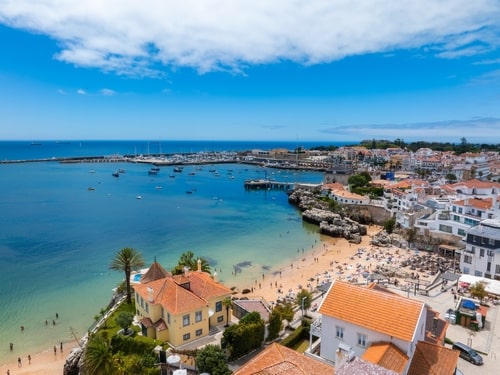
Portugal offers a range of visa options, including a digital nomad visa.
Portugal has a growing job market, attracting expats looking for work opportunities in various industries, from tourism and technology to finance and education. While salaries in Portugal tend to be lower than in other Western European countries, the lower cost of living balances out the financial equation for many professionals.
Expats from the EU, EEA, and Switzerland can work in Portugal without needing a work visa but must register for residency if staying long-term. Non-EU nationals, however, require a work visa, which is typically sponsored by an employer.
Common visa options for workers include the D1 Visa (for skilled professionals with a job offer) and the Highly Qualified Activity Visa, which is aimed at specialized professionals such as IT experts, engineers, and healthcare workers.
Portugal has a thriving technology and startup scene, with Lisbon emerging as a major hub for entrepreneurs and digital businesses. The Web Summit, one of the world’s largest tech conferences, has helped put Portugal on the map as an attractive destination for innovation and investment. Many expats working in tech, digital marketing, and software development find opportunities in Lisbon, Porto, and Braga.
The tourism and hospitality sector is another major employer, offering jobs in hotels, restaurants, and travel services, especially in popular areas like the Algarve, Lisbon, and Porto. English speakers are in demand in these roles, making it easier for expats without fluency in Portuguese to find work. Teaching English is also a viable option, with language schools and international schools hiring native English speakers.
For freelancers and remote workers, Portugal offers an excellent environment with affordable coworking spaces, a strong digital infrastructure, and visa options such as the Digital Nomad Visa. Many expats work remotely for foreign companies while enjoying Portugal’s lower cost of living and high quality of life.
Working in Portugal comes with benefits such as paid vacation (minimum of 22 days), social security contributions, and access to the national healthcare system. However, bureaucracy and administrative processes can sometimes be slow, so patience is key when applying for work permits, tax registration, and social security numbers.
Whether working for a Portuguese company, running a business, or freelancing remotely, Portugal provides a welcoming and dynamic job market for expats looking to build a career while enjoying a high quality of life.
Portugal’s Education System
Portugal offers a well-structured education system that includes public, private, and international schools, making it a suitable destination for expat families. The country’s education system is ranked highly in Europe, providing a strong academic foundation for students at all levels.
Public schools in Portugal are free for residents and follow the national curriculum. Portuguese is the primary language of instruction, which can be a challenge for expat children who are not yet fluent. However, some public schools offer integration programs for foreign students to help them learn Portuguese. Public schools are a great option for families planning to stay long-term and want their children to fully integrate into the local culture.
Private schools in Portugal provide an alternative to the public system, offering smaller class sizes and a more personalized learning experience. While most private schools still teach in Portuguese, they often have more flexibility in teaching methods and curriculum. With tuition fees vary depending on the school.
For expat families, international schools are a popular choice. These schools follow foreign curricula such as the British, American, French, or International Baccalaureate (IB) systems, and instruction is primarily in English or another international language. Many international schools are located in Lisbon, Cascais, Porto, and the Algarve, with top institutions including Carlucci American International School of Lisbon (CAISL), Oporto British School, and St. Julian’s School.
For higher education, Portugal has several prestigious universities, including the University of Lisbon, the University of Porto, and the University of Coimbra, which is one of the oldest in Europe. Many Portuguese universities offer programs in English, particularly at the master’s and PhD levels, making them attractive to international students.
Portuguese Culture & Lifestyle
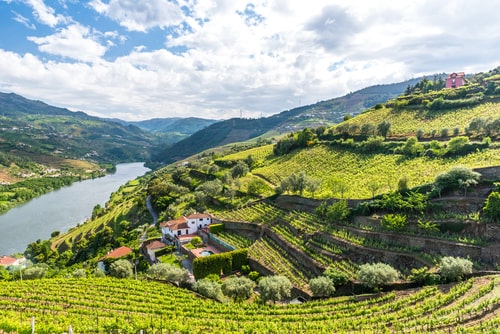
Portugal’s Douro Valley is famous for its wines, an important part of life in Portugal.
Portugal’s culture is deeply rooted in history, tradition, and a strong sense of community. Expats who move to Portugal quickly discover a warm, welcoming atmosphere where family, food, and social life play central roles.
The country offers a perfect balance between a relaxed Mediterranean lifestyle and modern conveniences, making it an attractive destination for those seeking a slower pace of life without sacrificing comfort. With places like Madeira offering relaxed, safe, and family-friendly destinations that blend Portuguese tradition with their own distinct identity.
One of the defining aspects of Portuguese culture is hospitality. Locals are generally friendly and open, and while many speak English, especially in major cities and tourist areas. Learning a few basic Portuguese phrases can go a long way in building relationships and integrating into the community. The Portuguese value politeness and courtesy, with greetings like a firm handshake or a kiss on both cheeks being common in social settings.
Food and wine are integral to life in Portugal. The country is famous for its fresh seafood, with bacalhau (salted cod), grilled sardines, and octopus rice being staple dishes. Portugal is also home to some of the best wines in the world, with regions like Douro Valley, Alentejo, and Vinho Verde producing top-quality varieties. The café culture is strong, and locals often take time to enjoy a coffee (bica) and a pastry, such as the iconic pastel de nata.
The work-life balance in Portugal is generally favorable, with a slower, more relaxed approach to daily life. Many businesses close for a long lunch break, and socializing over meals is an essential part of Portuguese culture. Family gatherings and festivals are common, with events like Carnaval, Festa de São João in Porto, and the Feast of Santo António in Lisbon showcasing Portugal’s deep-rooted traditions and love for celebrations.
The outdoor lifestyle is another reason why many expats are drawn to Portugal. The country’s mild climate allows for year-round activities such as hiking, surfing, and golfing. Portugal’s stunning coastline, particularly in the Algarve, Ericeira, and Nazaré, makes it one of Europe’s top destinations for surfing and beach lovers.
While Portugal has embraced modernity, bureaucracy can be slow, and administrative processes may take longer than expats are used to in other countries. Patience is essential when dealing with paperwork, residency applications, or setting up utilities. However, most expats find that the country’s laidback lifestyle and welcoming atmosphere more than make up for these minor frustrations.
Whether enjoying the food, festivals, or natural beauty, Portugal’s rich culture and relaxed way of life create a rewarding experience for those who choose to call it home.
Challenges of Moving to Portugal
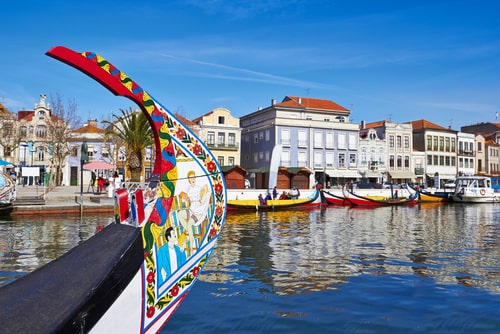
Moving to a new country will always present challenges, but leaning into your new culture will help with the adjustment process.
While Portugal offers an incredible quality of life, moving to Portugal, or any new country, always comes with challenges. Expats should be aware of potential difficulties in order to adjust smoothly and avoid frustration.
One of the most common challenges is bureaucracy. Administrative processes in Portugal can be slow and sometimes confusing, particularly when applying for residency, setting up utilities, or dealing with tax matters. Government offices often require multiple visits, and paperwork can take longer to process than expected. Patience and persistence are essential, and hiring a local consultant or lawyer can help navigate the system more efficiently.
The language barrier can also be an obstacle for expats who don’t speak Portuguese. While English is widely spoken in major cities and tourist areas, in smaller towns and rural regions, many locals primarily speak Portuguese. Learning the basics of the language can make daily life easier and improve interactions with locals, particularly in government offices, healthcare settings, and small businesses.
Another challenge is the job market and salaries. While Portugal has a growing economy, salaries tend to be lower compared to other Western European countries. For expats seeking employment, finding high-paying jobs can be difficult, especially if they don’t speak Portuguese fluently. However, remote work and entrepreneurship are growing in popularity, and many expats successfully build businesses or work for international companies while enjoying Portugal’s lower cost of living.
Housing availability and rising costs in major cities like Lisbon and Porto have become a concern in recent years due to increased demand from expats and digital nomads. Rental prices have risen significantly, making it harder to find affordable long-term accommodations. Expats looking to rent should start their search early and consider working with local real estate agents to find suitable options.
For those moving from countries with fast-paced lifestyles, adapting to Portugal’s slower pace can be a challenge. Portuguese culture places a strong emphasis on work-life balance, which means businesses may close for long lunch breaks, and customer service can sometimes be less urgent than in other countries. While this relaxed approach to life is part of Portugal’s charm, it may take some adjustment for newcomers.
Despite these challenges, most expats find that the benefits of living in Portugal far outweigh the difficulties. With the right preparation and mindset, adjusting to life in Portugal becomes a rewarding and enjoyable experience.
Is Portugal The Right Move?
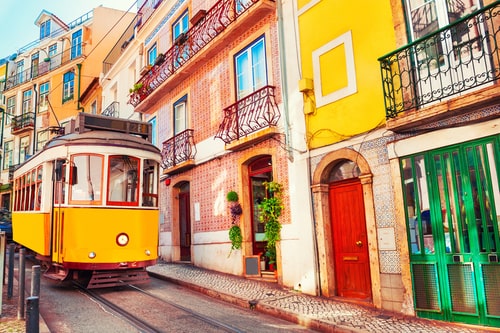
With so much to offer, including a laidback lifestyle and lower cost of living, it’s no surprise that Portugal has been attracting expats to its shores in recent years.
Moving to Portugal offers expats an incredible opportunity to enjoy a high quality of life, affordable living costs, and a welcoming culture. Whether you’re drawn to the vibrant cities of Lisbon and Porto, the stunning Silver Coast, the tourist towns of the Algarve, or the peaceful towns like Viana do Castelo, Portugal provides a variety of lifestyle options to suit different needs.
While the process of relocating comes with challenges such as navigating bureaucracy, adapting to the language, and finding housing. But proper preparation and patience can make the transition easier. With a strong healthcare system, a range of visa options, and an increasing number of expat communities, Portugal continues to be a top choice for those looking to start a new chapter abroad.
By understanding the residency process, cost of living, job market, and cultural differences, expats can make informed decisions and fully embrace all that Portugal has to offer. Whether you’re moving for work, retirement, or adventure, Portugal’s mix of history, modern comforts, and laid-back lifestyle makes it an ideal place to call home.

Sign up to Overseas Dream Home now, and Discover The Best Places in the World to Buy Real Estate 2025.
Enter your email now to download The Best Places in the World to Buy Real Estate in 2025.
You’ll also start receiving your free Overseas Dream Home eletter in your inbox every day!
No-spam pledge: We value your privacy. You can unsubscribe at any time.